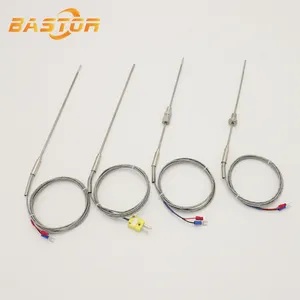
















A gas heater thermocouple is a critical safety device in gas heating systems, designed to measure temperatures and ensure the proper functioning of the heater. This small but essential component serves as a temperature sensor, generating a voltage when the thermocouple's junction is heated, which in turn, keeps the gas valve open. Should the pilot light go out, the drop in temperature causes the voltage to decrease, prompting the valve to close and preventing gas leaks.
Thermocouples come in various types, each suited to different temperature ranges and environments. In the realm of gas heating, the thermal coupling on a water heater and the thermal coupling furnace are commonly employed. These components are not only pivotal in residential water heaters but also play a significant role in industrial furnaces, ensuring they operate within safe temperature parameters.
The construction of a thermocouple typically involves two different metals joined at one end. The gas water heater thermocouple, for instance, is often made from a combination of nickel and chromium or nickel and aluminum, known for their durability and responsiveness to temperature changes. The choice of materials is crucial as it directly impacts the thermocouple's longevity and accuracy.
Using a thermocouple in gas heaters, such as a gas hot water tank thermocouple, offers the advantage of direct temperature measurement, which translates to quick response times and efficient safety controls. The simplicity of their design also means they are relatively easy to replace, with procedures like changing a thermocouple on a water heater or thermocouple replacement furnace being straightforward enough for many to perform without professional help.
Maintenance of a thermocouple is minimal, but regular checks are recommended to ensure optimal performance. Signs that a thermocouple may need replacing include difficulties in keeping the pilot light lit or a non-functioning heater. Water heater thermocouple replacement and gas water heater thermocouple replacement are routine procedures that can restore the functionality of your heating system.
Selecting the correct thermocouple is vital for the safety and efficiency of your gas heater. Factors to consider include the temperature range, the environment in which it will be used, and compatibility with your specific heater model. Whether you need a hot water heater thermocouple or a thermal coupling for gas heater, it is important to choose a component that matches your system's requirements.